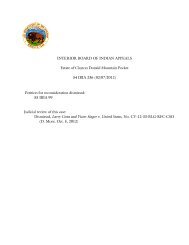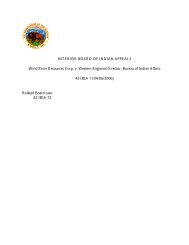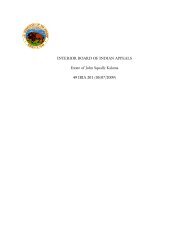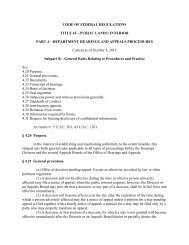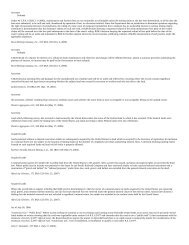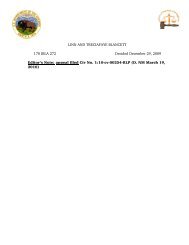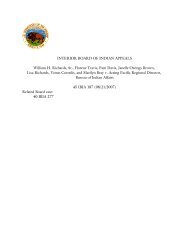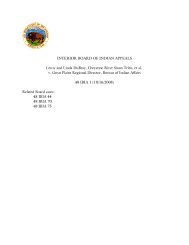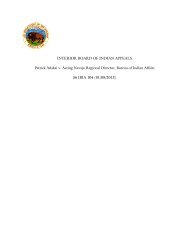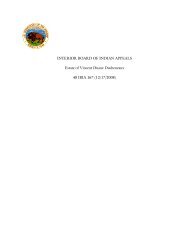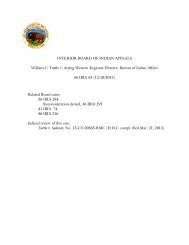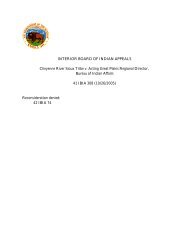50 IBIA 82 - About the Office of Hearings and Appeals
50 IBIA 82 - About the Office of Hearings and Appeals
50 IBIA 82 - About the Office of Hearings and Appeals
You also want an ePaper? Increase the reach of your titles
YUMPU automatically turns print PDFs into web optimized ePapers that Google loves.
INTERIOR BOARD OF INDIAN APPEALS<br />
Estate <strong>of</strong> Drucilla (Trucilla) W. Pickard<br />
<strong>50</strong> <strong>IBIA</strong> <strong>82</strong> (07/29/2009)
United States Department <strong>of</strong> <strong>the</strong> Interior<br />
OFFICE OF HEARINGS AND APPEALS<br />
INTERIOR BOARD OF INDIAN APPEALS<br />
801 NORTH QUINCY STREET<br />
SUITE 300<br />
ARLINGTON, VA 22203<br />
ESTATE OF DRUCILLA (TRUCILLA)<br />
W. PICKARD<br />
)<br />
)<br />
)<br />
)<br />
)<br />
Order Affirming Decision<br />
Docket No. <strong>IBIA</strong> 08-39<br />
July 29, 2009<br />
Carrie Zipprich Garl<strong>and</strong> (Appellant or Carrie) appeals to <strong>the</strong> Board <strong>of</strong> Indian <strong>Appeals</strong><br />
(Board), from an Order Denying Petition for Rehearing entered December 11, 2007 (Order<br />
Denying Rehearing), by Administrative Law Judge Richard L. Reeh (ALJ or Judge) in <strong>the</strong><br />
Estate <strong>of</strong> Drucilla (Trucilla) W. Pickard (Decedent or Drucilla), deceased Wichita Indian,<br />
Probate No. P-0000-37395-IP. The Order Denying Rehearing let st<strong>and</strong> an Order<br />
Approving Will <strong>and</strong> Decree <strong>of</strong> Distribution issued by Judge Reeh on October 8, 2007<br />
(Decree). The Decree approved Decedent’s latest will <strong>and</strong> rejected <strong>the</strong> efforts <strong>of</strong> several will<br />
contestants to show that Decedent did not have testamentary capacity to execute <strong>the</strong> will or<br />
that she was subject to undue influence when she did so.<br />
In her appeal to this Board, Appellant submits evidence in <strong>the</strong> form <strong>of</strong> a medical<br />
record showing Decedent to have experienced health problems, <strong>and</strong> an audiotape allegedly<br />
showing that Decedent changed her mind about her will approximately a year after signing it.<br />
Appellant claims to have more evidence, in <strong>the</strong> form <strong>of</strong> conversation between Appellant <strong>and</strong><br />
her bro<strong>the</strong>r, showing that Decedent was subject to coercion from her bro<strong>the</strong>r. Finally, she<br />
challenges testimony <strong>of</strong> o<strong>the</strong>rs at a probate hearing <strong>and</strong> findings rendered by Judge Reeh, <strong>and</strong><br />
claims that Judge Reeh unfairly <strong>and</strong> prematurely terminated <strong>the</strong> probate proceeding. She<br />
asks <strong>the</strong> Board to order <strong>the</strong> release <strong>of</strong> medical records to be used as evidence <strong>of</strong> Decedent’s<br />
mental capacity, <strong>and</strong> to order a rehearing.<br />
We affirm <strong>the</strong> Order Denying Rehearing. With respect to <strong>the</strong> medical record<br />
showing Decedent to have diabetes <strong>and</strong> to have been “noncompliant” in taking her<br />
medication, nei<strong>the</strong>r <strong>the</strong> submitted medical record nor Appellant’s pr<strong>of</strong>fer regarding what<br />
fur<strong>the</strong>r records would show is probative <strong>of</strong> Decedent’s testamentary capacity to execute a will.<br />
1<br />
Accordingly, we find that Judge Reeh correctly denied <strong>the</strong> petition under 43 C.F.R. 4.241.<br />
1<br />
The Department’s probate regulations were amended in 2008 to incorporate <strong>the</strong><br />
provisions <strong>of</strong> <strong>the</strong> American Indian Probate Reform Act <strong>of</strong> 2004, as amended, primarily<br />
(continued...)<br />
<strong>50</strong> <strong>IBIA</strong> <strong>82</strong>
Appellant’s several arguments <strong>and</strong> pr<strong>of</strong>fers <strong>of</strong> evidence constitute new information not raised<br />
at <strong>the</strong> hearing or in <strong>the</strong> petition. Such matters are not within <strong>the</strong> scope <strong>of</strong> <strong>the</strong> appeal <strong>and</strong><br />
<strong>the</strong>refore not properly before <strong>the</strong> Board. 43 C.F.R. § 4.318. Moreover, we do not find that<br />
Appellant has presented a justification for us to consider new evidence or arguments through<br />
<strong>the</strong> exercise <strong>of</strong> our discretionary authority under section 4.318. We disagree that <strong>the</strong> record<br />
shows any evidence that Judge Reeh prematurely terminated <strong>the</strong> hearing or erred in<br />
construing <strong>the</strong> evidence, <strong>and</strong> we find nothing relevant to <strong>the</strong> validity <strong>of</strong> <strong>the</strong> will in Appellant’s<br />
grievances regarding her siblings’ testimony.<br />
Background<br />
Drucilla (Trucilla) W. Pickard (previous married names, Zipprich, Argo, <strong>and</strong> Parton)<br />
was born April 27, 1931, <strong>and</strong> died April 2, 2005, as a resident <strong>of</strong> Oklahoma. She died<br />
unmarried. She bore seven children, one <strong>of</strong> whom was adopted outside <strong>the</strong> family, as<br />
follows: William Albert Zipprich (born 1954); Michael Stephen Zipprich (born 1955);<br />
David Anthony Zipprich (born 1957); Jeanne Marie Zipprich Negron (born 1960); Judith<br />
Ann Zipprich, adopted name Lindsay Ann Knapp Barrilleaux (born 1963); Carrie Eileen<br />
Zipprich Garl<strong>and</strong> (born 1965); <strong>and</strong> Ollie Jean Argo Nimsey (born 1976). Though Judith<br />
(Lindsay) was adopted out, she <strong>and</strong> Decedent maintained a personal relationship.<br />
At <strong>the</strong> time <strong>of</strong> her death, Decedent had no money in her Individual Indian Money<br />
account. She owned a number <strong>of</strong> trust real estate interests, including some in minerals, in<br />
allotments described more fully below.<br />
The record shows that Decedent made at least five wills. The first, in 1979,<br />
bequea<strong>the</strong>d her trust property interests to her seven biological children <strong>and</strong> to her <strong>the</strong>nhusb<strong>and</strong><br />
Albert Argo. In 1983, she prepared ano<strong>the</strong>r will devising her trust property to her<br />
six non-adopted children, her car to her daughter who was adopted out, <strong>and</strong> money to her<br />
<strong>the</strong>n-husb<strong>and</strong> Elton Parton. In 1995, she prepared a new will excluding a reference to any<br />
husb<strong>and</strong> <strong>and</strong> expressly devising specific allotments to each biological child. In this will, she<br />
employed a format that she retained in subsequent amendments that she made in 2003. We<br />
set forth terms <strong>of</strong> <strong>the</strong> 1995 will to show, by contrast, amendments later made <strong>and</strong> opposed in<br />
this appeal.<br />
1<br />
(...continued)<br />
codified at 25 U.S.C. §§ 2201, et seq. The rules governing Indian probate hearings will be<br />
codified at a new 43 C.F.R. Part 30. This case is governed by <strong>the</strong> prior version <strong>of</strong> <strong>the</strong><br />
regulations, <strong>and</strong> <strong>the</strong> citations to 43 C.F.R. Part 4 are to <strong>the</strong> regulations as codified in 2006,<br />
unless o<strong>the</strong>rwise noted.<br />
<strong>50</strong> <strong>IBIA</strong> 83
2<br />
Paragraph Second – a devise to Jeanne M. Zipprich Negron <strong>and</strong> Michael Zipprich <strong>of</strong><br />
all <strong>of</strong> Decedent’s interest in <strong>the</strong> “allotment <strong>of</strong> Daisy Caley, Wichita 561 in equal shares <strong>of</strong> an<br />
undivided one-half (1/2 each).”<br />
Paragraph Third – a devise to William A. Zipprich <strong>of</strong> all <strong>of</strong> Decedent’s interest in <strong>the</strong><br />
“allotments <strong>of</strong> Chester Collins, Wichita 245, Oscar Leonard, Wichita 487, <strong>and</strong> Rose<br />
Leonard, Wichita 488.”<br />
Paragraph Fourth – a devise to David Zipprich <strong>of</strong> all <strong>of</strong> Decedent’s interest in <strong>the</strong><br />
“allotments <strong>of</strong> Korhakeuskau, Wichita 408, Marcutdauace, Wichita 409, Wayneokachat,<br />
Wichita 240, <strong>and</strong> Ahshaykeahskates, Wichita 593.” 3<br />
Paragraph Fifth – a devise to Judith Ann Zipprich (Lindsay) <strong>of</strong> all <strong>of</strong> Decedent’s<br />
interest in <strong>the</strong> “allotment <strong>of</strong> Darcharsunahdekos, Wichita 365.”<br />
Paragraph Sixth – a devise to Carrie Eileen Zipprich <strong>of</strong> all <strong>of</strong> Decedent’s interest in <strong>the</strong><br />
“allotments <strong>of</strong> Lu<strong>the</strong>r Campbell, Wichita 573, <strong>and</strong> Schley Pickard, Wichita 4<strong>82</strong>.”<br />
Paragraph Seventh – a devise to “Ollie Jean Zipprich, daughter, all my interest in <strong>the</strong><br />
allotment <strong>of</strong> Cap Pickard, Wichita 362.” 4<br />
Paragraph Eighth – a devise to Jeanne M. Zipprich <strong>of</strong> all <strong>of</strong> Decedent’s interest in <strong>the</strong><br />
“allotment <strong>of</strong> Herbert Ross, Wichita 293.”<br />
The “rest <strong>and</strong> residue” clause bequea<strong>the</strong>d any remaining property to Michael Zipprich. In<br />
sum, <strong>the</strong> 1995 will included specific bequeaths <strong>of</strong> allotments to all seven <strong>of</strong> her <strong>of</strong>fspring.<br />
According to <strong>the</strong> record, <strong>the</strong> values <strong>of</strong> <strong>the</strong>se allotments widely varied.<br />
2<br />
The “Paragraph First” <strong>of</strong> all versions addressed payment <strong>of</strong> debts not relevant here.<br />
3<br />
This number 593, present in all versions <strong>of</strong> <strong>the</strong> will, is an error which was corrected by<br />
Judge Reeh in a manner not at issue here.<br />
4<br />
Paragraph Seventh <strong>of</strong> <strong>the</strong> 1995 will listed Ollie Jean under <strong>the</strong> name “Zipprich” ra<strong>the</strong>r<br />
than her name “Argo.” The use <strong>of</strong> <strong>the</strong> name “Ollie Jean Zipprich” was carried over into all<br />
subsequent versions <strong>of</strong> <strong>the</strong> will.<br />
<strong>50</strong> <strong>IBIA</strong> 84
On January 14, 2003, Decedent amended her will to provide a life estate for Michael<br />
in <strong>the</strong> mineral interests in <strong>the</strong> Wichita 362, 487, <strong>and</strong> 488 allotments, with <strong>the</strong> remainder to<br />
be shared on Michael’s death among <strong>the</strong> six remaining biological children. The will<br />
established this devise in a new Paragraph Second, renumbered o<strong>the</strong>r paragraphs, <strong>and</strong> limited<br />
<strong>the</strong> remaining devise <strong>of</strong> <strong>the</strong>se three allotments to a “surface only” distribution. A final<br />
paragraph gave Michael, as life tenant, <strong>the</strong> right to issue leases, rights <strong>of</strong> way, <strong>and</strong> easements<br />
for <strong>the</strong> mineral estates at issue in <strong>the</strong> new Paragraph Second, <strong>and</strong> to receive any bonuses,<br />
royalties, or o<strong>the</strong>r monies, to <strong>the</strong> exclusion <strong>of</strong> <strong>the</strong> remaindermen.<br />
On October 21, 2003, Decedent amended <strong>the</strong> January 2003 will. She changed <strong>the</strong><br />
devise to Appellant (Carrie) to provide that Appellant must share her devise with Michael<br />
Zipprich, <strong>and</strong> also transferred <strong>the</strong> Lu<strong>the</strong>r Campbell allotment, Wichita 573, formerly devised<br />
to Appellant, to add it to <strong>the</strong> devise to David Zipprich. She also inserted a new Paragraph<br />
Tenth devising all personal belongings to Michael, <strong>and</strong> renumbered <strong>the</strong> eleventh paragraph.<br />
The residuary clause in both 2003 versions remained unchanged. The following presents <strong>the</strong><br />
terms <strong>of</strong> <strong>the</strong> final will with January 2003 amendments made in bold <strong>and</strong> October 2003<br />
changes in italics:<br />
Paragraph Second – a devise to Michael Zipprich <strong>of</strong> <strong>the</strong> mineral interests in “<strong>the</strong><br />
allotments <strong>of</strong> Capp Pickard, Wichita 362, Oscar Leonard, Wichita 487 <strong>and</strong> Rose<br />
Leonard, Wichita 488,” <strong>and</strong> upon his death to vest in <strong>the</strong> remaining six <strong>of</strong> Decedent’s<br />
biological children as tenants in common.<br />
Paragraph Third – a devise to Jeanne M. Zipprich Negron <strong>and</strong> Michael Zipprich <strong>of</strong><br />
all <strong>of</strong> Decedent’s interest in <strong>the</strong> “allotment <strong>of</strong> Daisy Caley, Wichita 561 in equal shares <strong>of</strong> an<br />
undivided one-half (1/2) each.”<br />
Paragraph Fourth – a devise to William A. Zipprich <strong>of</strong> all <strong>of</strong> Decedent’s interest in<br />
<strong>the</strong> “allotments <strong>of</strong> Chester Collins, Wichita 245, <strong>and</strong> surface only to <strong>the</strong> allotments <strong>of</strong> Oscar<br />
Leonard, Wichita 487, <strong>and</strong> Rose Leonard, Wichita 488.”<br />
Paragraph Fifth – a devise to David Zipprich <strong>of</strong> all <strong>of</strong> Decedent’s interest in <strong>the</strong><br />
“allotments <strong>of</strong> Korhakeuskau, Wichita 408, Marcutdauace, Wichita 409, Wayneokachat,<br />
Wichita 240, <strong>and</strong> Ahshaykeahskates, Wichita 593, <strong>and</strong> Lu<strong>the</strong>r Campbell, Wichita 573.”<br />
Paragraph Sixth – a devise to Judith Ann Zipprich (Lindsay) <strong>of</strong> all <strong>of</strong> Decedent’s<br />
interest in <strong>the</strong> “allotment <strong>of</strong> Darcharsunahdekos, Wichita 365.”<br />
Paragraph Seventh – a devise to Carrie Zipprich Garl<strong>and</strong> <strong>and</strong> Michael Zipprich <strong>of</strong> all<br />
<strong>of</strong> Decedent’s interest in only <strong>the</strong> “allotment <strong>of</strong> Schley Pickard, Wichita 4<strong>82</strong>.”<br />
<strong>50</strong> <strong>IBIA</strong> 85
Paragraph Eighth – a devise to “Ollie Jean Zipprich, daughter, all my interest <strong>of</strong><br />
surface only to <strong>the</strong> allotment <strong>of</strong> Cap Pickard, Wichita 362.”<br />
Paragraph Ninth – a devise to Jeanne M. Zipprich <strong>of</strong> all <strong>of</strong> Decedent’s interest in <strong>the</strong><br />
“allotment <strong>of</strong> Herbert Ross, Wichita 293.”<br />
Paragraph Tenth – a devise to Michael Zipprich <strong>of</strong> all personal belongings <strong>and</strong> <strong>the</strong><br />
contents <strong>of</strong> Decedent’s home.<br />
Paragraph Eleventh – a direction that Michael Zipprich could issue oil <strong>and</strong> gas<br />
leases, rights <strong>of</strong> way, or easements as <strong>the</strong> life tenant <strong>of</strong> <strong>the</strong> mineral estate, <strong>and</strong> collect<br />
monies, to <strong>the</strong> exclusion <strong>of</strong> <strong>the</strong> remaindermen.<br />
Property records in <strong>the</strong> probate record do not sufficiently differentiate values <strong>of</strong> <strong>the</strong><br />
mineral <strong>and</strong> surface estates <strong>of</strong> <strong>the</strong> three allotments divided in Paragraph Second to convey <strong>the</strong><br />
effect <strong>of</strong> <strong>the</strong> January 2003 amendments to Decedent’s will, which separated <strong>the</strong> mineral estate<br />
<strong>of</strong> <strong>the</strong> three allotments (Cap Pickard, Wichita 362; Oscar Leonard, Wichita 487; <strong>and</strong> Rose<br />
Leonard, Wichita 488) <strong>and</strong> gave a life estate in minerals to Michael. It is possible to ascertain<br />
that <strong>the</strong> values <strong>of</strong> <strong>the</strong> trust real estate devised to Judith (Lindsay) (over $4,000) <strong>and</strong><br />
Jeanne M. (under $300) were significantly less than values <strong>of</strong> devises to o<strong>the</strong>rs. By contrast,<br />
<strong>the</strong> value <strong>of</strong> <strong>the</strong> real estate interests devised to David Zipprich exceeded $100,000. The effect<br />
<strong>of</strong> <strong>the</strong> October 2003 amendments was to (a) change <strong>the</strong> bequest for <strong>the</strong> Lu<strong>the</strong>r Campbell<br />
allotment (Wichita 573) from Appellant to David Zipprich, a relative increase to him <strong>and</strong> a<br />
relative decrease to Appellant <strong>of</strong> $16,586, <strong>and</strong> (b) cause Appellant to share with Michael<br />
Zipprich a <strong>50</strong>% interest in <strong>the</strong> Schley Pickard allotment (Wichita 4<strong>82</strong>), a total value <strong>of</strong><br />
$47,818, <strong>and</strong> an additional decrease in Appellant’s share <strong>of</strong> almost $24,000.<br />
After Decedent’s death, Appellant requested a hearing. Letter from Carrie to<br />
Judge Reeh, Oct. 20, 2006. This letter did not present any views with respect to <strong>the</strong> will.<br />
Judge Reeh conducted a hearing on September 12, 2007.<br />
At <strong>the</strong> hearing, five <strong>of</strong> Decedent’s children appeared. David <strong>and</strong> William Zipprich did<br />
not. Two spouses appeared. The scrivener <strong>of</strong> <strong>the</strong> October 2003 will, Gwen Tongkeamah,<br />
appeared, along with a will witness, Jan Stumblingbear, <strong>and</strong> <strong>the</strong> notary public present at <strong>the</strong><br />
will signing, S<strong>and</strong>ra Bointy-Tsotigh. The second will witness had died.<br />
Tongkeamah testified that Decedent appeared on October 21, 2003, to change her<br />
will. Transcript <strong>of</strong> Hearing, Sept. 12, 2007 (Tr.), at 7-8. She explained that Decedent<br />
appeared alone at Tongkeamah’s <strong>of</strong>fice, where <strong>the</strong> two met with no o<strong>the</strong>rs present for about<br />
<strong>50</strong> <strong>IBIA</strong> 86
45 minutes, during which <strong>the</strong>y discussed Decedent’s plans to amend <strong>the</strong> will to make “two<br />
changes.” Id. at 8-9, 13. Tongkeamah testified that Decedent seemed to be thinking clearly,<br />
<strong>and</strong> was clear about <strong>the</strong> changes she wanted to make. Tongkeamah testified that <strong>the</strong> January<br />
2003 version <strong>of</strong> <strong>the</strong> will remained on <strong>the</strong> BIA computer system, <strong>and</strong> she thus “pulled up” <strong>the</strong><br />
will, at which point Decedent advised her to take out <strong>the</strong> tract <strong>of</strong> l<strong>and</strong> from Paragraph<br />
Seventh, <strong>and</strong> “add[] a person in.” Id. at 10. Tongkeamah testified that Decedent signed <strong>the</strong><br />
will in front <strong>of</strong> <strong>the</strong> witnesses <strong>and</strong> notary. Id. at 11. S<strong>and</strong>ra Bounty-Tsotigh testified that she<br />
witnessed <strong>the</strong> will signing, <strong>and</strong> that, while she did not remember <strong>the</strong> specific event, her<br />
signature as notary represented that <strong>the</strong> testator signed in her presence. Id. at 14-16.<br />
Stumblingbear testified that Decedent “made it clear to me, Dru did, what she wanted after<br />
introducing us, <strong>the</strong>n she signed it <strong>and</strong> we signed it, witnessing her signature.” Id. at 15.<br />
Appellant <strong>and</strong> Ollie opposed <strong>the</strong> will, complaining that <strong>the</strong>y did not believe <strong>the</strong>ir<br />
mo<strong>the</strong>r had been competent to execute a will because she had medical problems. Tr. at 18-<br />
19 (Ollie). Ollie complained that her own name was incorrectly listed as Zipprich, <strong>and</strong> that<br />
5<br />
this reflected that her mo<strong>the</strong>r “was [not] really <strong>the</strong>re.” Id. at 19. Carrie testified regarding<br />
her mo<strong>the</strong>r’s living conditions in a set <strong>of</strong> buildings <strong>and</strong> trailers near Anadarko which <strong>the</strong>y<br />
called “<strong>the</strong> compound.” Id. at 20-21. She asserted that her bro<strong>the</strong>rs Michael <strong>and</strong> David lived<br />
on <strong>the</strong> compound to take care <strong>of</strong> <strong>the</strong>ir mo<strong>the</strong>r, but she complained that <strong>the</strong>y did not do a<br />
good job <strong>of</strong> it. Id. at 22. Carrie <strong>and</strong> her husb<strong>and</strong> John Garl<strong>and</strong> testified that Decedent was<br />
frequently admitted to hospitals for various conditions related to diabetes, insulin reactions,<br />
<strong>and</strong> congestive heart failure; had had amputations <strong>of</strong> her toes in 1999; <strong>and</strong> possibly suffered<br />
from Parkinson’s disease. Id. at 22-26. They testified that <strong>the</strong>y had tried to convince her to<br />
get nursing care but that she was under duress from Michael. Id. at 25.<br />
Jose Negron, husb<strong>and</strong> <strong>of</strong> Jeanne, objected to <strong>the</strong> Garl<strong>and</strong>s’ testimonies <strong>and</strong> asserted<br />
that Michael <strong>and</strong> David were “<strong>the</strong> only ones <strong>the</strong>re helping” <strong>the</strong>ir mo<strong>the</strong>r. Tr. at 27. He<br />
testified that <strong>the</strong> sons would drive Drucilla from Anadarko to Norman to visit Jeanne, <strong>and</strong><br />
disagreed that <strong>the</strong>y abused Drucilla in any way. Id. at 28-29. He complained that Drucilla<br />
felt aggrieved <strong>and</strong> “hassled” by Carrie. Id. at 30. Judith (Lindsay) testified that she had<br />
developed a relationship with her biological mo<strong>the</strong>r in later life, that <strong>the</strong>y communicated, that<br />
“Mike took care <strong>of</strong> her,” that Decedent “would say that Carrie was difficult” <strong>and</strong> “mean,” <strong>and</strong><br />
that Decedent would o<strong>the</strong>rwise complain about Carrie. Id. at 33, 35. Jeanne testified that<br />
“<strong>the</strong>re was nothing wrong with [Decedent’s] mind,” id. at 36, <strong>and</strong> Michael agreed that she<br />
“was <strong>of</strong> sound mind.” Id. at 37.<br />
5<br />
As noted above, Ollie was listed under <strong>the</strong> name Zipprich in <strong>the</strong> 1995 will, a devise which<br />
was ei<strong>the</strong>r copied or carried through as part <strong>of</strong> <strong>the</strong> same document in <strong>the</strong> 2003 will. There<br />
is no argument in this case about Decedent’s competence to execute a will in 1995.<br />
<strong>50</strong> <strong>IBIA</strong> 87
The hearing devolved into grievances among <strong>the</strong> siblings, who raised a number <strong>of</strong><br />
complaints against each o<strong>the</strong>r without relevance to <strong>the</strong> issue <strong>of</strong> Decedent’s capacity to execute<br />
a will. Judge Reeh attempted to refocus <strong>the</strong> proceeding on Decedent’s capacity at <strong>the</strong> time<br />
she executed her will but little was added on that point. Turning to Tongkeamah, Tsotigh,<br />
<strong>and</strong> Stumblingbear, Judge Reeh asked if any <strong>of</strong> <strong>the</strong> testimony had caused any <strong>of</strong> <strong>the</strong>m to<br />
rethink or change her views regarding whe<strong>the</strong>r Decedent had appeared to be competent to<br />
execute a will on that date <strong>of</strong> its signing. They all responded “no.” Tr. at 40.<br />
Judge Reeh explained that he was compelled to conduct a hearing for a separate case,<br />
<strong>and</strong> gave all witnesses a chance to summarize <strong>the</strong>ir positions. Carrie concluded by asserting<br />
that her mo<strong>the</strong>r was not <strong>of</strong> sound mind, had bad health, frequently forgot to take her insulin<br />
causing sugar “highs <strong>and</strong> lows,” <strong>and</strong> was subject to her bro<strong>the</strong>rs’ dependency on her for her<br />
money. Tr. at 44. She asserted that her mo<strong>the</strong>r’s “medical records prove” that she was not<br />
<strong>of</strong> sound mind. Carrie explained that she had a “tape recording <strong>of</strong> it” to prove her points.<br />
She explained that she had<br />
recorded my mo<strong>the</strong>r crying <strong>and</strong> telling me Michael is mean to me <strong>and</strong> he<br />
mistreats me <strong>and</strong> he has no respect for me. I made a terrible mistake. I’ve<br />
changed my will. I realize now. I’m so sick <strong>and</strong> I’m not <strong>of</strong> sound [sic], I have<br />
it all on a recording <strong>and</strong> I recorded it. I have a recording <strong>of</strong> when she was in<br />
duress when David came <strong>and</strong> lunged at her <strong>and</strong> she felt threatened.<br />
Id. at 45. Jose Negron gave a contradictory response. Id. at 47. Judge Reeh concluded <strong>the</strong><br />
hearing. Carrie did not submit any evidence into <strong>the</strong> record at <strong>the</strong> hearing or <strong>the</strong>reafter.<br />
On October 3, 2007, Judge Reeh issued his Decree. Describing <strong>the</strong> evidence <strong>and</strong> <strong>the</strong><br />
interested parties’ testimonies <strong>and</strong> positions, he found that none <strong>of</strong> <strong>the</strong>m had demonstrated<br />
that <strong>the</strong> will was invalid, even if he assumed <strong>the</strong> factual assertions were entirely accurate.<br />
Decree at 4. He stated that no evidence had been presented that Decedent was subject to<br />
undue influence, <strong>and</strong> explained that, “[t]o invalidate a will, convincing pro<strong>of</strong> must be<br />
furnished to show that undue influence was actually exerted.” Id. at 4 (citations omitted).<br />
He also explained that <strong>the</strong> burden <strong>of</strong> pro<strong>of</strong> <strong>of</strong> testamentary capacity was on <strong>the</strong> will<br />
contestants, <strong>and</strong> that <strong>the</strong>y must show that <strong>the</strong> “will-maker did not know <strong>the</strong> natural objects <strong>of</strong><br />
her bounty, <strong>the</strong> extent <strong>of</strong> her property, or <strong>the</strong> desired distribution.” Id. at 5 (citations<br />
omitted). He noted that, at best, <strong>the</strong> will contestants had presented opinions as to<br />
Decedent’s mental capacity at <strong>the</strong> relevant time, but that <strong>the</strong>y had not overcome <strong>the</strong><br />
“testimony, including independent evidence, [that] showed that <strong>the</strong> decedent was thinking<br />
clearly.” Id. He explained:<br />
<strong>50</strong> <strong>IBIA</strong> 88
Even though <strong>the</strong> decedent was diabetic, had congestive heart failure, had<br />
difficulty getting around, may have had lapses <strong>of</strong> analytic ability <strong>and</strong> was over<br />
<strong>the</strong> age <strong>of</strong> seventy, <strong>the</strong> scrivener <strong>and</strong> will witnesses were persuaded that she was<br />
acting independently <strong>of</strong> her own volition, that she was thinking clearly, that she<br />
was aware <strong>of</strong> <strong>the</strong> importance <strong>of</strong> making a will <strong>and</strong> that she had <strong>the</strong> capacity to<br />
do so. Their observations were not overcome by evidence that was presented<br />
by <strong>the</strong> contestants.<br />
Id. Addressing Appellant’s assertion that Decedent had later changed her mind, he explained<br />
that in <strong>the</strong> absence <strong>of</strong> action by Decedent to change her will, <strong>the</strong> Department has no<br />
authority to disapprove it based on allegations <strong>of</strong> an intent different from that expressed in<br />
<strong>the</strong> will itself. Id. at 4 (citation omitted).<br />
On November 27, 2007, Appellant submitted a “petition to appeal” which Judge<br />
Reeh properly construed as a Petition for Rehearing pursuant to 43 C.F.R. § 4.241. She<br />
claimed a need for additional time “to obtain documentation <strong>and</strong> witness testimony <strong>of</strong> undue<br />
influence on <strong>the</strong> part <strong>of</strong> heir Michael Zipprich.” She claimed that “it is necessary that <strong>the</strong><br />
court order release <strong>of</strong> medical records” from <strong>the</strong> Indian Health Services <strong>and</strong> Comanche<br />
Memorial Hospital in Lawton, Oklahoma, <strong>and</strong> “any o<strong>the</strong>r medical entity that may hold<br />
records <strong>of</strong> <strong>the</strong> health <strong>of</strong> Drucilla Pickard” because “<strong>the</strong>y will prove <strong>the</strong> incompetence <strong>of</strong><br />
Drucilla Pickard” during <strong>the</strong> relevant time frame. She claimed that she did not produce<br />
medical evidence at <strong>the</strong> hearing as a result <strong>of</strong> <strong>the</strong> Health Insurance Portability <strong>and</strong><br />
6<br />
Accountability Act (HIPAA).<br />
On December 11, 2007, Judge Reeh issued <strong>the</strong> Order Denying Rehearing. He<br />
explained that <strong>the</strong> petition “was not under oath, <strong>and</strong> it did not specifically state grounds upon<br />
which relief should be granted.” He noted that requirements for a proper Petition for<br />
Rehearing were sent out with <strong>the</strong> decision, including <strong>the</strong> obligation to accompany newly<br />
discovered evidence with affidavits <strong>of</strong> witnesses stating fully what such testimony is to be <strong>and</strong><br />
providing justifiable reasons why <strong>the</strong> evidence was not discovered <strong>and</strong> tendered at <strong>the</strong><br />
hearing. Accordingly, he rejected Appellant’s petition for its failure to conform to that rule.<br />
Appellant submitted a Notice <strong>of</strong> Appeal on February 11, 2008. She presents seven<br />
enumerated arguments — two arguments objecting to Judge Reeh’s conclusion in <strong>the</strong> Order<br />
Denying Rehearing <strong>and</strong> five submitting new arguments or evidence against <strong>the</strong> Decree.<br />
First, she objects to Judge Reeh’s conclusion in <strong>the</strong> Order Denying Rehearing that she did<br />
6<br />
HIPAA was enacted in 1996, inter alia, to regulate <strong>the</strong> disclosure <strong>of</strong> health information.<br />
See Pub. L. No. 104-191, 110 Stat. 1936 (1996).<br />
<strong>50</strong> <strong>IBIA</strong> 89
not clearly state <strong>the</strong> grounds for her petition, asserting that her grounds were <strong>the</strong> need for<br />
medical records. Notice <strong>of</strong> Appeal point 1. Second, she claims that her petition had<br />
explained that HIPAA prevented her from obtaining <strong>the</strong>m before <strong>the</strong> hearing. Id. point 2.<br />
Appellant’s third enumerated point relates to “new evidence” to challenge <strong>the</strong> Decree<br />
in <strong>the</strong> form <strong>of</strong> a medical record dated October 7, 2003, which states that Decedent was<br />
“‘non-compliant’ in <strong>the</strong> requirement to take insulin for a diabetic condition.” Notice <strong>of</strong><br />
Appeal point 3. From this, Appellant concludes that “Drucilla Pickard was likely under <strong>the</strong><br />
influence <strong>of</strong> a diabetic reaction during <strong>the</strong> timeframe <strong>of</strong> <strong>the</strong> October 2003 making <strong>of</strong> <strong>the</strong> will<br />
<strong>and</strong> thus not <strong>of</strong> sound mind.” Id. Next, she submits <strong>the</strong> audiotape alluded to at <strong>the</strong> hearing,<br />
<strong>and</strong> claims that it shows that Decedent meant to change her will <strong>and</strong> make Carrie “sole heir<br />
<strong>of</strong> <strong>the</strong> ‘West Place’, Wichita 4<strong>82</strong>.” Id. point 4. Within her point 4, Appellant also claims,<br />
seemingly unrelated to <strong>the</strong> audiotape, that her bro<strong>the</strong>r Michael coerced <strong>the</strong>ir mo<strong>the</strong>r to make<br />
“<strong>the</strong> January 2003 <strong>and</strong> October 2003 change[s],” apparently because he was dependent on<br />
7<br />
Drucilla for his income <strong>and</strong> lifestyle. Id. Appellant discusses a dispute between herself <strong>and</strong><br />
Michael resulting in his eviction from <strong>the</strong> property after <strong>the</strong>ir mo<strong>the</strong>r’s death. She asserts that<br />
“<strong>the</strong>re is evidence that Michael intended to control <strong>the</strong> actions or livelihood <strong>of</strong> Drucilla<br />
Pickard,” citing a conversation in which Michael allegedly admitted tapping <strong>the</strong>ir mo<strong>the</strong>r’s<br />
phone, denying her any access to vehicles, <strong>and</strong> intercepting her mail. Id.<br />
In her fifth point, Appellant asserts “discrepancies in <strong>the</strong> [Decree].” She challenges<br />
Judge Reeh’s conclusions based on testimonies <strong>of</strong> Jose Negron <strong>and</strong> Judith (Lindsay), <strong>and</strong><br />
states her belief that he misconstrued Ollie’s assertion regarding whe<strong>the</strong>r Michael was present<br />
at <strong>the</strong>ir mo<strong>the</strong>r’s death. Notice <strong>of</strong> Appeal point 5. Next, she claims that Judge Reeh<br />
improperly restricted testimony at <strong>the</strong> hearing in order to proceed to ano<strong>the</strong>r case, <strong>and</strong> that<br />
she attempted to obtain a transcript <strong>and</strong> tape but was told <strong>the</strong>y were not available. Id. point<br />
6. Finally, she asks <strong>the</strong> Board to order <strong>the</strong> release <strong>of</strong> medical records. Id. point 7.<br />
On June 4, 2008, Appellant submitted an Opening Brief enumerating six points. In<br />
points 1 <strong>and</strong> 2, she argues that Judge Reeh denied her due process rights by placing time<br />
constraints on <strong>the</strong> hearing, <strong>and</strong> adds that he should have called for a continuance because “all<br />
evidence was not available nor heard.” She complains that she requested <strong>the</strong> ALJ to release<br />
medical records necessary to prove Decedent’s medical capacity but her request was denied.<br />
Opening Brief points 3 <strong>and</strong> 4. She complains that Judge Reeh did not sufficiently respond to<br />
<strong>the</strong> fact that Ollie’s last name was listed as Zipprich, instead <strong>of</strong> Argo, in <strong>the</strong> will. Id. point 5.<br />
Finally, she asserts that <strong>the</strong> ALJ “may have been biased.” Id. point 6. She concludes by<br />
requesting a rehearing.<br />
7<br />
These comments suggest that Appellant opposes any changes made to <strong>the</strong> 1995 will. Our<br />
holding relates to evidence, or a lack <strong>the</strong>re<strong>of</strong>, for <strong>the</strong> entire 2003 time period.<br />
<strong>50</strong> <strong>IBIA</strong> 90
On June 12, 2008, Jeanne Marie Zipprich Negron submitted an Answer. She<br />
submits evidence, including tribal court decisions, regarding <strong>the</strong> dispute between Carrie <strong>and</strong><br />
Michael regarding his continued presence on “<strong>the</strong> compound.” She objects to Appellant’s<br />
appeal in all respects.<br />
Discussion<br />
Appellant bears <strong>the</strong> burden <strong>of</strong> showing that an order denying rehearing is in error.<br />
Estate <strong>of</strong> Lizzie McBride Rhoan, 46 <strong>IBIA</strong> 262, 265 (2008). Simple disagreement with or bare<br />
assertions concerning a challenged decision are insufficient to carry this burden <strong>of</strong> pro<strong>of</strong>.<br />
Estate <strong>of</strong> John Squally Kalama, 49 <strong>IBIA</strong> 201, 204 (2009). Fur<strong>the</strong>r, we normally decline to<br />
consider an issue presented for <strong>the</strong> first time on appeal. Isaac A. Bunney <strong>and</strong> Cheri L. Bunney<br />
v. Pacific Regional Director, 49 <strong>IBIA</strong> 26, 31 (2009).<br />
Appellant has not met her burden <strong>and</strong> has raised a number <strong>of</strong> arguments <strong>and</strong><br />
evidentiary issues for <strong>the</strong> first time on appeal. For both reasons we affirm <strong>the</strong> decision. It is<br />
worth explaining, however, <strong>the</strong> process <strong>of</strong> a probate hearing to provide Appellant with an<br />
explanation as to why Judge Reeh declined her petition <strong>and</strong> why she loses on appeal.<br />
Judge Reeh was correct to deny <strong>the</strong> Petition for Rehearing because it failed entirely to<br />
comport with <strong>the</strong> applicable rule governing such a request. Under 43 C.F.R. § 4.241(a)(1),<br />
a petition must, under oath, clearly <strong>and</strong> concisely state <strong>the</strong> grounds on which it is based. If<br />
based on newly-discovered evidence, <strong>the</strong> petition must (i) be accompanied by an affidavit or<br />
declaration stating fully what <strong>the</strong> new testimony is to be, <strong>and</strong> (ii) provide “justifiable reasons<br />
for <strong>the</strong> failure to discover <strong>and</strong> present [newly discovered] evidence” not presented during <strong>the</strong><br />
probate hearing. Id. § 4.241(a)(2).<br />
The petition failed to meet this rule. Its arguments for rehearing fell into two<br />
categories. Appellant contended that she needed (a) more time “to obtain documentation<br />
<strong>and</strong> witness testimony <strong>of</strong> undue influence on <strong>the</strong> part <strong>of</strong> heir Michael Zipprich”; <strong>and</strong> (b) a<br />
“court order release <strong>of</strong> medical records” from <strong>the</strong> Indian Health Services <strong>and</strong> Comanche<br />
Memorial Hospital in Lawton, Oklahoma, <strong>and</strong> “any o<strong>the</strong>r medical entity that may hold<br />
records <strong>of</strong> <strong>the</strong> health <strong>of</strong> Drucilla Pickard,” which she had not produced because <strong>of</strong> HIPAA.<br />
Nei<strong>the</strong>r argument met <strong>the</strong> st<strong>and</strong>ards <strong>of</strong> 43 C.F.R. § 4.241. Fundamentally,<br />
Appellant’s two assertions are requests for more time to obtain information for her will<br />
challenge; <strong>the</strong> petition demonstrated that Appellant came to <strong>the</strong> hearing unprepared to<br />
challenge <strong>the</strong> will with evidence necessary to support her contentions. Instead <strong>of</strong> defining <strong>the</strong><br />
information she could provide to prove undue influence or identifying <strong>the</strong> exact facilities that<br />
would have evidence regarding her mo<strong>the</strong>r, Appellant’s petition sought to ga<strong>the</strong>r new<br />
<strong>50</strong> <strong>IBIA</strong> 91
evidence. Her assertion that she had been precluded from ga<strong>the</strong>ring evidence by Federal law<br />
was unsupported by any plausible evidence that she had attempted to do so, <strong>and</strong> her<br />
comment regarding “any o<strong>the</strong>r medical entity that may hold records” suggests that she<br />
believed <strong>the</strong> burden may be on <strong>the</strong> <strong>Office</strong> <strong>of</strong> <strong>Hearings</strong> <strong>and</strong> <strong>Appeals</strong> (OHA) to conduct an<br />
investigation. To <strong>the</strong> contrary, “it was for those contesting <strong>the</strong> will or codicil, not <strong>the</strong> judge,<br />
to make <strong>the</strong> decision whe<strong>the</strong>r to obtain medical information <strong>and</strong> whe<strong>the</strong>r to submit it.”<br />
Estate <strong>of</strong> Frederick Harry Jerred, 49 <strong>IBIA</strong> 147, 161 (2009). A will contestant is required to<br />
raise all <strong>of</strong> his or her issues or arguments at <strong>the</strong> probate hearing. Estate <strong>of</strong> Thomas Sun Goes<br />
Slow, 23 <strong>IBIA</strong> 99, 100 (1992). The purpose <strong>of</strong> a petition for rehearing, as it relates to<br />
evidence, is to permit a petitioner to submit, under oath, evidence that is “newly discovered”<br />
along with a description <strong>of</strong> <strong>the</strong> evidence <strong>and</strong> why it was not presented before. A petition for<br />
rehearing is not an opportunity for a contestant to start an investigation to support her<br />
position. Judge Reeh was correct to deny <strong>the</strong> petition as failing to meet <strong>the</strong> st<strong>and</strong>ards <strong>of</strong> <strong>the</strong><br />
applicable rule.<br />
Nei<strong>the</strong>r <strong>the</strong> Notice <strong>of</strong> Appeal nor <strong>the</strong> Opening Brief meets Appellant’s burden <strong>of</strong><br />
showing that Judge Reeh was wrong. To <strong>the</strong> extent she argues that she met <strong>the</strong> requirements<br />
<strong>of</strong> <strong>the</strong> rule in her Notice <strong>of</strong> Appeal points 1 <strong>and</strong> 2, those arguments merely reiterate those<br />
presented in <strong>the</strong> petition <strong>and</strong> fail to explain why she did not present a petition under oath,<br />
with newly discovered evidence, accompanied by an affidavit or declaration describing fully<br />
what <strong>the</strong> evidence is with justifiable explanation for failure to discover it before. Complaints<br />
regarding HIPAA, without pro<strong>of</strong> that she did anything to obtain <strong>the</strong> medical records, are<br />
simply insufficient to meet her burden to show error in <strong>the</strong> Order Denying Rehearing. 8<br />
O<strong>the</strong>r arguments submitted by Appellant seek to argue her case anew with<br />
information she did not present at <strong>the</strong> hearing. Relevant to this appeal, <strong>the</strong> Board’s<br />
jurisdiction is limited to review <strong>of</strong> an order on a petition for rehearing. 43 C.F.R. § 4.320;<br />
Estate <strong>of</strong> David Martin Champagne, 49 <strong>IBIA</strong> 209, 210 (2009). An appeal is not ordinarily an<br />
opportunity for presenting a new case, with information never provided in <strong>the</strong> hearing or in a<br />
petition for rehearing. See 43 C.F.R. § 4.318 (scope <strong>of</strong> review). Although this Board has<br />
8<br />
Though Appellant may remember <strong>the</strong> hearing as she describes in her Opening Brief<br />
points 3 <strong>and</strong> 4, where she claims that she asked <strong>the</strong> ALJ to “release medical records,” but he<br />
denied her request, <strong>the</strong> transcript reveals only that she alluded to <strong>the</strong> existence <strong>of</strong> medical<br />
records. There is no instance in which she timely sought medical records by asking for an<br />
OHA subpoena to specific institutions, nor is <strong>the</strong>re a denial <strong>of</strong> such a request. As we held<br />
in Estate <strong>of</strong> Jeannette Light Adams, 39 <strong>IBIA</strong> 32, 39 (2003), <strong>the</strong> “Board declines to find that<br />
<strong>the</strong> Judge committed any error in failing to subpoena a witness that Appellants did not ask<br />
to have subpoenaed during <strong>the</strong> hearing phase <strong>of</strong> this proceeding.”<br />
<strong>50</strong> <strong>IBIA</strong> 92
authority to correct a manifest injustice or error, reviewing <strong>the</strong> information provided, we find<br />
no basis for exercising that authority. Instead, we conclude that Appellant’s evidence<br />
suggests a misunderst<strong>and</strong>ing <strong>of</strong> <strong>the</strong> appropriate tests for determining ei<strong>the</strong>r that Decedent<br />
was competent to execute a will, or that a will should be invalidated for undue influence.<br />
In order to invalidate a will for lack <strong>of</strong> testamentary capacity, a will opponent must<br />
show that “<strong>the</strong> testator did not know <strong>the</strong> natural object <strong>of</strong> her bounty, <strong>the</strong> extent <strong>of</strong> her<br />
property, or <strong>the</strong> desired distribution,” at <strong>the</strong> time <strong>of</strong> execution <strong>of</strong> <strong>the</strong> will. Estate <strong>of</strong> Adams,<br />
39 <strong>IBIA</strong> at 33, citing Estate <strong>of</strong> Fannie P<strong>and</strong>oah Fisher Silver, 16 <strong>IBIA</strong> 26, 28 (1988); Estate <strong>of</strong><br />
Samuel Tsoodle, 11 <strong>IBIA</strong> 163, 166 (1983). That <strong>the</strong> testator may have disinherited putative<br />
heirs or blood relatives, or made an unequal distribution to <strong>the</strong>m, is not evidence <strong>of</strong> a lack <strong>of</strong><br />
testamentary capacity. Estate <strong>of</strong> Joseph Red Eagle, 4 <strong>IBIA</strong> 52, 60 (1975). Fur<strong>the</strong>r, a medical<br />
diagnosis alone is not sufficient to show a lack <strong>of</strong> testamentary capacity, in <strong>the</strong> absence <strong>of</strong> a<br />
showing that <strong>the</strong> testator did not o<strong>the</strong>rwise meet <strong>the</strong> st<strong>and</strong>ards articulated above. Estate <strong>of</strong><br />
Jerred, 49 <strong>IBIA</strong> at 162.<br />
The disinterested will scrivener, witness <strong>and</strong> notary all testified credibly that Decedent<br />
had testamentary capacity. The will opponents did not present any evidence that she “did not<br />
know <strong>the</strong> natural object <strong>of</strong> her bounty, <strong>the</strong> extent <strong>of</strong> her property, or <strong>the</strong> desired distribution”<br />
when executing her will. That she suffered diabetes, had sugar “highs” <strong>and</strong> “lows,” refused or<br />
forgot to take her medicine, or had congestive heart failure is not probative <strong>of</strong> <strong>the</strong>se elements.<br />
The medical record submitted by Appellant with her Notice <strong>of</strong> Appeal does not demonstrate<br />
a lack <strong>of</strong> testamentary capacity; likewise, Appellant’s assertions at <strong>the</strong> hearing <strong>and</strong> to this<br />
Board regarding medical records showing diagnoses <strong>of</strong> Decedent’s health issues are<br />
unsupported by any credible averments that <strong>the</strong>y would prove that Decedent did not know<br />
<strong>the</strong> natural objects <strong>of</strong> her bounty, <strong>the</strong> extent <strong>of</strong> her property, or a plan for <strong>the</strong> desired<br />
distribution. Accordingly, we find no basis for reconsidering <strong>the</strong> outcome based on<br />
Appellant’s pr<strong>of</strong>fer <strong>of</strong> medical records or her claim that she needs more <strong>of</strong> <strong>the</strong>m. Notice <strong>of</strong><br />
9<br />
Appeal points 3 <strong>and</strong> 7.<br />
Likewise, Appellant’s pr<strong>of</strong>fers regarding undue influence do not comport with <strong>the</strong><br />
st<strong>and</strong>ards we must examine to determine whe<strong>the</strong>r a will should be invalidated for that reason.<br />
The burden <strong>of</strong> pro<strong>of</strong> to show undue influence is on <strong>the</strong> will contestant. Estate <strong>of</strong> Clarence<br />
Thompson Burke, 18 <strong>IBIA</strong> 1 (1989). To overturn a will on grounds <strong>of</strong> undue influence, a will<br />
9<br />
Contrary to Appellant’s request, Notice <strong>of</strong> Appeal point 7, this Board does not have<br />
authority to issue subpoenas. Hardy v. Midwest Regional Director, 46 <strong>IBIA</strong> 47, 59 (2007).<br />
In any event, <strong>the</strong> request submitted to this Board for a subpoena is <strong>the</strong> first direct request<br />
for Departmental assistance in obtaining <strong>the</strong> records, <strong>and</strong> such efforts are untimely.<br />
<strong>50</strong> <strong>IBIA</strong> 93
opponent must meet a stringent four-part test to show: (1) decedent was susceptible <strong>of</strong><br />
being dominated by ano<strong>the</strong>r; (2) <strong>the</strong> person allegedly influencing decedent in <strong>the</strong> execution<br />
<strong>of</strong> his will was capable <strong>of</strong> controlling his mind <strong>and</strong> actions; (3) such a person did exert<br />
influence upon decedent <strong>of</strong> a nature calculated to induce or coerce him to make a will<br />
contrary to his own desires; <strong>and</strong> (4) <strong>the</strong> will is contrary to decedent’s desires. Estate <strong>of</strong><br />
Lyman Z. Penn, 46 <strong>IBIA</strong> 272, 280 (2008), citing Estate <strong>of</strong> Adams, 39 <strong>IBIA</strong> at 36. In<br />
addition, “where a confidential relationship exists, <strong>the</strong>re is a presumption <strong>of</strong> undue influence,<br />
which does not depend upon pro<strong>of</strong> that undue influence was actually exerted upon <strong>the</strong><br />
testator.” Estate <strong>of</strong> George Fishbird, 40 <strong>IBIA</strong> 167, 169 (2004). The presumption <strong>of</strong> undue<br />
influence is applied where: (1) a confidential relationship existed; (2) <strong>the</strong> person in <strong>the</strong><br />
confidential relationship actively participated in <strong>the</strong> preparation <strong>of</strong> <strong>the</strong> will; <strong>and</strong> (3) <strong>the</strong><br />
person in confidence was <strong>the</strong> principal beneficiary under <strong>the</strong> will. Id.<br />
In <strong>the</strong> best case for Appellant, <strong>the</strong> evidence at <strong>the</strong> hearing suggested an opportunity for<br />
Michael or David to attempt to control or coerce Decedent. Nothing presented at <strong>the</strong><br />
hearing suggested that ei<strong>the</strong>r <strong>of</strong> <strong>the</strong>m actually exerted such an influence as required in <strong>the</strong><br />
four-part test, or actively participated in <strong>the</strong> will’s preparation as required to establish a<br />
presumption <strong>of</strong> undue influence. Appellant’s pr<strong>of</strong>fer <strong>of</strong> pro<strong>of</strong> regarding Michael’s actions,<br />
Notice <strong>of</strong> Appeal point 4, likewise, does not supply evidence necessary to prove undue<br />
influence, <strong>and</strong>, in any event, her allegations were contradicted by Michael, Negron, <strong>and</strong><br />
Judith (Lindsay) at <strong>the</strong> hearing, <strong>and</strong> by Jeanne in her Answer. In light <strong>of</strong> such testimonials,<br />
we find no basis whatsoever to question Judge Reeh’s conclusion that Appellant failed to<br />
meet her burden <strong>of</strong> pro<strong>of</strong> to overcome <strong>the</strong> will based on undue influence, or to find that she<br />
could do so at ano<strong>the</strong>r hearing. Estate <strong>of</strong> Burke, 18 <strong>IBIA</strong> at 1.<br />
Appellant’s audiotape, Notice <strong>of</strong> Appeal point 4, is not sufficient to establish that<br />
Decedent revoked or amended any provision <strong>of</strong> <strong>the</strong> will. At <strong>the</strong> hearing, Appellant testified<br />
that this tape would show that her mo<strong>the</strong>r was “crying” <strong>and</strong> complaining about her<br />
mistreatment at <strong>the</strong> h<strong>and</strong>s <strong>of</strong> Michael <strong>and</strong> David. Tr. at 45. In fact, <strong>the</strong> audiotape primarily<br />
contains <strong>the</strong> voice <strong>of</strong> Carrie (<strong>and</strong> her husb<strong>and</strong>) discussing her reasons for audiotaping her<br />
10<br />
mo<strong>the</strong>r on October 3, 2004. Even assuming <strong>the</strong> third voice is that <strong>of</strong> Decedent, that voice<br />
states in its entirety:<br />
OK, I told my daughter that I made a mistake by putting him on <strong>the</strong>re. So I<br />
want that changed to <strong>the</strong> original way I had it fixed. I want her to have <strong>the</strong><br />
10<br />
On <strong>the</strong> tape, Carrie explains <strong>the</strong> reason for making <strong>the</strong> record was in case her mo<strong>the</strong>r was<br />
“unable” to change her will before she passed away. We note that Decedent lived for<br />
ano<strong>the</strong>r 6 months after Carrie made <strong>the</strong> recording.<br />
<strong>50</strong> <strong>IBIA</strong> 94
whole thing, <strong>the</strong> whole 170 acres what’s <strong>the</strong>re. Drucilla Pickard, I’m speaking.<br />
I’m worried about this <strong>and</strong> now I have it <strong>of</strong>f my mind. That’s <strong>the</strong> way I want<br />
it.<br />
Audiotape, as transcribed by <strong>the</strong> Board.<br />
OHA cannot amend Decedent’s will on this basis. The audiotape is not a will or an<br />
amendment to one. To revoke or repudiate a will, <strong>the</strong> testator must destroy <strong>the</strong> original or<br />
execute <strong>the</strong> revocation with <strong>the</strong> same formalities as are required in <strong>the</strong> execution <strong>of</strong> <strong>the</strong> will,<br />
43 C.F.R. § 4.260(c), which in this case must include “attest[ation] by two disinterested<br />
adult witnesses.” Id. § 4.260(a). The only way for Decedent to have accomplished a change<br />
in her will was to amend it. As we stated in Estate <strong>of</strong> Henry Beavert, “even if decedent had<br />
stated an intention to leave certain property to appellant, intent alone has never been held<br />
sufficient to create, alter, or revoke an Indian will. Because decedent took no action to<br />
change his will, <strong>the</strong> Department has no authority to disapprove [it] . . . .” 18 <strong>IBIA</strong> 73, 75<br />
(1989). Similarly, in Estate <strong>of</strong> Edith Walker Brown, 43 <strong>IBIA</strong> 221, 227 (2006), we held:<br />
“While <strong>the</strong> Board acknowledges Appellant’s apparent frustration that Decedent never signed<br />
a new will, assuming she desired to do so, <strong>the</strong> Board must give effect to <strong>the</strong> wishes stated in a<br />
valid will. It is immaterial whe<strong>the</strong>r Decedent desired to execute a new will — intent alone is<br />
not sufficient to create, alter, or revoke an Indian will.”<br />
Even assuming Appellant is correct that <strong>the</strong> audiotape shows that Decedent regretted<br />
her will, this would not change <strong>the</strong> fact that <strong>the</strong> will was never amended to accomplish a<br />
revision <strong>of</strong> it. Assuming that we were to make <strong>the</strong> many factual findings necessary to prove<br />
<strong>the</strong> identity <strong>of</strong> <strong>the</strong> voice on <strong>the</strong> audiotape, that it was not based on coercion, <strong>and</strong> that <strong>the</strong><br />
references to property in <strong>the</strong> tape relate to Paragraph Seventh <strong>of</strong> <strong>the</strong> will, at most, <strong>the</strong><br />
audiotape only shows what Appellant seeks to disprove. The person purporting to be<br />
Drucilla acknowledges that Drucilla had made a will which, upon her death, would transfer<br />
property to a son; was fully capable <strong>of</strong> underst<strong>and</strong>ing that she had done so; was aware <strong>of</strong> <strong>the</strong><br />
will’s contents <strong>and</strong> consequences; <strong>and</strong> implied that she regretted a portion <strong>of</strong> <strong>the</strong> will but still<br />
did nothing to change it. Accordingly, <strong>the</strong> audiotape would not provide a justification ei<strong>the</strong>r<br />
for a finding that Judge Reeh committed any error in approving <strong>the</strong> will or a finding that a<br />
hearing is necessary to consider it.<br />
Appellant’s arguments regarding <strong>the</strong> process are unsupported. Though <strong>the</strong> transcript<br />
indicates that <strong>the</strong> ALJ advised <strong>the</strong> hearing participants <strong>of</strong> ano<strong>the</strong>r hearing scheduled to take<br />
place after <strong>the</strong> closure <strong>of</strong> <strong>the</strong> hearing in Decedent’s estate, it does not show that he violated<br />
<strong>the</strong>ir due process rights. Opening Brief points 1 <strong>and</strong> 2; Notice <strong>of</strong> Appeal point 6. To <strong>the</strong><br />
contrary, he gave all participants, <strong>and</strong> particularly Appellant, <strong>the</strong> right to present a summary<br />
<strong>of</strong> his or her contentions. In her lengthy concluding statement, Carrie did not indicate that<br />
<strong>50</strong> <strong>IBIA</strong> 95
she had additional evidence to present or ano<strong>the</strong>r argument to make, nor did she express a<br />
desire for <strong>the</strong> continuance that she now claims he should have granted. We find no error on<br />
<strong>the</strong> part <strong>of</strong> Judge Reeh in <strong>the</strong> conduct <strong>of</strong> <strong>the</strong> hearing, or in his conclusions regarding <strong>the</strong><br />
conflicting testimony, that would affect <strong>the</strong> outcome <strong>of</strong> this matter. Id. point 5.<br />
Appellant’s arguments regarding conflicting testimony would not alter <strong>the</strong> outcome.<br />
Even if Appellant’s complaints regarding remarks <strong>of</strong> her bro<strong>the</strong>r could justify ano<strong>the</strong>r hearing<br />
to allow Appellant <strong>and</strong> her bro<strong>the</strong>r to challenge each o<strong>the</strong>rs’ conversations, such a hearing<br />
would only revisit <strong>the</strong> debate between Appellant <strong>and</strong> her siblings at <strong>the</strong> prior probate hearing,<br />
which was irrelevant to Decedent’s capacity to execute a will. And even assuming Appellant’s<br />
contentions regarding her bro<strong>the</strong>r are true, <strong>the</strong>y show at most that her bro<strong>the</strong>r was<br />
controlling toward Decedent <strong>and</strong> had an incentive to obtain his mo<strong>the</strong>r’s property. That<br />
Michael may have had a controlling personality <strong>and</strong> behavior <strong>and</strong> a desire for a devise is not<br />
determinative <strong>of</strong> Appellant’s underlying premise — that her mo<strong>the</strong>r’s decision to change her<br />
will in 2003 was based on undue influence or a lack <strong>of</strong> competency to do so.<br />
Finally, as noted above, Ollie’s name first appeared as Ollie Jean Zipprich in <strong>the</strong> 1995<br />
will which Appellant apparently seeks to enforce. Opening Brief point 5. We reject any<br />
suggestion that its carry-through into <strong>the</strong> 2003 wills is probative <strong>of</strong> Decedent’s testamentary<br />
capacity in 2003. And we are unable to discern Appellant’s basis for asking us to conclude<br />
that Judge Reeh was biased. Id. point 6. We thus find no basis, even in 43 C.F.R. § 4.318,<br />
for concluding that Appellant’s arguments reflect that a manifest injustice or error may have<br />
occurred or may occur if we affirm Judge Reeh’s decision.<br />
Conclusion<br />
Therefore, pursuant to <strong>the</strong> authority delegated to <strong>the</strong> Board <strong>of</strong> Indian <strong>Appeals</strong> by <strong>the</strong><br />
Secretary <strong>of</strong> <strong>the</strong> Interior, 43 C.F.R. § 4.1, we affirm <strong>the</strong> Order Denying Rehearing.<br />
I concur:<br />
// original signed // original signed<br />
Lisa Hemmer<br />
Steven K. Linscheid<br />
Administrative Judge*<br />
Chief Administrative Judge<br />
*Interior Board <strong>of</strong> L<strong>and</strong> <strong>Appeals</strong>, sitting by designation.<br />
<strong>50</strong> <strong>IBIA</strong> 96



